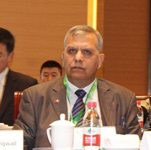Zamir Ahmed Awan: The year of economic cooperation
January 21 , 2019
Infrastructure and power generation were the focus of early harvest projects under China-Pakistan Economic Corridor (CPEC). Most of such projects have been completed or are in the advanced stage of completion. As Pakistan has completed the pre-requisites, it is now ready to enter into “economic cooperation” with China in a big way.
China and Pakistan agreed to make 2019 the “year of industrial, socio-economic and agriculture cooperation”.
As a follow-up to the recently concluded Joint Cooperation Committee (JCC) of the China-Pakistan Economic Corridor (CPEC), Chinese Ambassador to Pakistan Yao Jing and Pakistan’s Minister for Planning and Development Makhdum Khusro Bakhtyar held a meeting on attracting Chinese investors to the country, according to a press release.
Bakhtyar said the memorandum of understanding on industrial cooperation, signed during the 8th JCC, provided a framework to promote communication on key industries such as textile, petrochemical and iron and steel, and encourage Chinese investors to relocate and explore opportunities in Pakistan.
To facilitate Chinese investors, it was suggested to make the Board of Investment (BoI) as the lead agency in promoting industrial development and coordinate Pakistan’s land, energy, taxation, customs, law and other relevant departments to conduct research on the “most critical issues such as land prices, industrial park development models, implementation of industrial projects, professional tax policies and infrastructure support for all SEZs,”, as it will facilitate the Chinese investors and rapid industrialization of Pakistan.
It was agreed by both sides that Rashakai in Khyber Pakhtunkhwa, M3 SEZ in Faisalabad, Punjab, and Dhabeji in Thatta, Sindh, should be prioritized for development “that meet the needs of investment companies and promote the construction of SEZs, as soon as possible, and actively attract more enterprises to invest and build factories including in Information Technology SEZ in Islamabad”.
The Planning Commission, in its press release, said Chinese Ambassador Yao Jing appreciated that “8th JCC meeting finalized the deliverables to expand the scope of cooperation between China and Pakistan to new avenues and both sides agreed to expedite work by promoting joint ventures and export-led growth under CPEC by declaring 2019 as year of industrial, socio-economic and agriculture cooperation.”
Pakistan is preparing new incentive-based policies which could make Pakistan an ideal destination for Chinese investment in different sectors for industries planned for relocation and the government will facilitate Chinese investors looking for opportunities under CPEC and create “a pull effect”.
The minister said the first meeting of the joint working group (JWG) on socio-economic development was a major milestone and the action plan discussed therein will support uplift of less developed areas. Pakistan has already forwarded invitation letter to China for the visit of its expert team.
The two sides agreed “to work for speedy implementation of initiatives in already identified six priority areas including agriculture, education, medical treatment, poverty alleviation, water supply and vocational training projects.”
Bakhtyar hoped the JWG meeting on agriculture, scheduled for Feb 15, will provide an opportunity to broaden CPEC cooperation. He emphasized that Chinese investors should explore investment opportunities in Pakistan’s agriculture sector for input supplies as well as food production, processing, logistics, marketing and exports in a vertically integrated way on their own or in joint ventures (B2B) with local companies.
Both sides agreed to ensure that this year Gwadar projects such as new international airport, hospital and vocational institutes hit the ground within three months “to benefit local population and gain the support and trust of the local people.”

Zamir Ahmed Awan is a senior fellow with Center for China and Globalization(CCG) and a sinologist at the National University of Sciences and Technology.
Topical News See more






